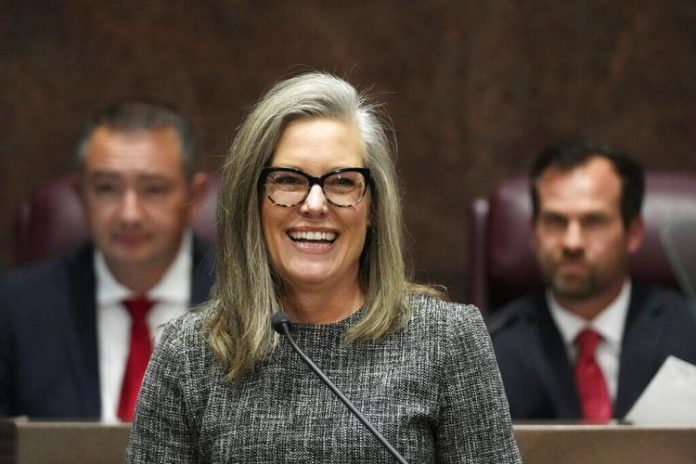
Arizona Gov. Katie Hobbs has vetoed a potential extension of a half-cent statewide sales tax measure that would have replaced the current infrastructure funding model.
Senate Bill 1246 would have maintained the same sales tax that’s set to expire in 2025 but would have limited ways the tax dollars can be spent, including money going toward expanding the Valley’s polarizing light rail line.
“I’m dedicated to continuing Arizona’s economic growth, building and attracting businesses, and creating good-paying jobs for Arizona workers,” Hobbs said in a news release. “This partisan bill does none of those things. I encourage legislators to vote on the compromise that is supported by a bipartisan majority in the House and Senate, community leaders, and cities in Maricopa County.”
Originally approved in 1985, Prop. 400 funded many major infrastructure projects across the state, including the 101 highway system that surrounds the Valley. The Maricopa Association of Governments said Prop. 400 cost taxpayers $664.8 million in fiscal year 2022. That’s an increase of more than $107 million from the prior year when the economy was still recovering from the COVID-19 pandemic.
Republicans were negotiating with Hobbs’ office on the matter but appeared to have left the issue at loggerheads.
“We took out the holes,” Senate President Warren Peterson, R-Gilbert, said in a floor debate on the bill. “This is actually very close to what has been put out there, but there were these loopholes in there that we cleaned up.”
Local mayors, who stand to benefit from the continued revenue stream, supported Hobbs’ veto.
“Thank you, Governor Hobbs, for your leadership on this issue. We hope the Legislature will reconsider the cities’ Prop 400 compromise bill, that would deliver quality-of-life benefits for all residents, and strengthen the economy for our region and state,” said Mesa Mayor John Giles. “Cities are committed to getting a balanced, multi-modal plan to the voters.”
Supporters of the initial Prop. 400 spending plan have said they plan to put the measure before voters.
Republished with the permission of The Center Square.













